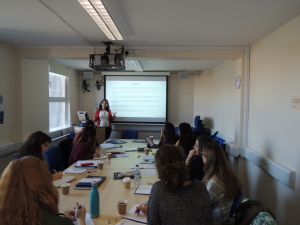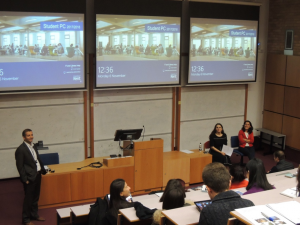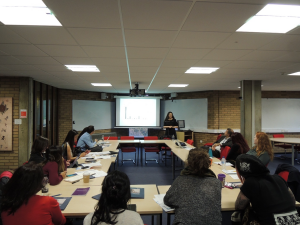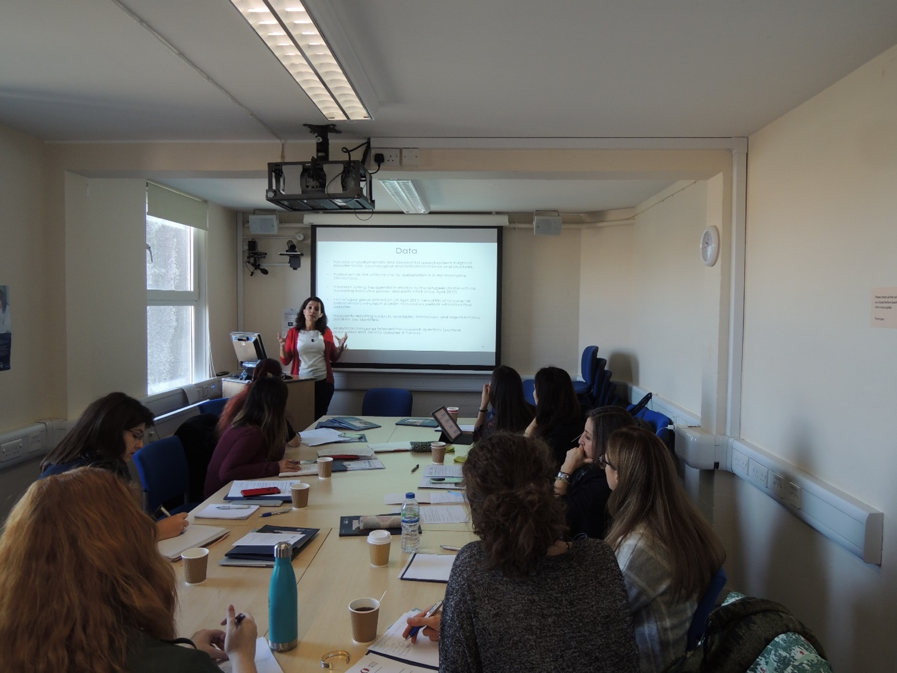On Monday the 6th of November CARC, and the School of Politics and International Relations at the University of Kent, hosted a workshop on population movements in and from the Eastern Mediterranean, in collaboration with the Middle East Technical University (METU). The speakers discussed issues as diverse as the socio-economic implications of migration, discourses surrounding refugees and the intergenerational consequences of migration.
During the first panel Bahriye Kemal (UoK), Rabia Polat (Essex University/Isik University) and Duygu Ozaltin (UoK) each presented their research. Bahriye Kemal, coming from a postcolonial/literary perspective, showed ‘literary trails’ that she created based on the writings of Cypriot writers living in the diaspora. Rabia Polat spoke about the dominant discourse in the portrayal of Syrian refugees by the Turkish government and Duygu Ozaltin presented her findings on the socio-economic causes of forced migration in post-Saddam Iraq.

During an Open Forum event, Rabia Polat and Ayse Guveli debated if Islam and European values are compatible and if this really is the question that we should be asking. Based on their own research both Polat and Guveli concluded that the question should be changed. Polat for example suggested that instead, we should ask why some European countries are better at integrating Muslims than others? This was followed by an interesting discussion with the audience, as not everyone agreed with the speakers on their conclusions. Specifically, there was disagreement about the question: ‘what are Islamic and what are European values?’.

In the afternoon, Ayse Guveli gave the Keynote lecture on intergenerational consequences of migration. She presented her research project ‘2000 Families: Migration Histories of Turks in Europe’, which analysed how values, relationships and behaviour of migrants have changed among the different generations and compared them with the families of returnees and non-migrants. It was very interesting to learn about her theory of ‘dissimilation from origin’, which is the process of becoming different from one’s country of origin or social origin.

During the last Panel, Muzzafer Kutlay presented her research on Turkish migration to Bulgaria and Işık Kuşçu and Hayriye Kahveci gave an analysis of how the Turkish Cypriot diaspora is involved in the Cypriot conflict. A member of the audience illustrated this point by providing the example of her own Turkish Cypriot family, which is part of the diaspora and deeply divided over the conflict.
As part of the METU-CARC workshop at the University of Kent, another METU lecture was held on Wednesday the 8th of November. This lecture was given by Işık Kuşçu entitled ‘Locating Diasporas in International Relations: The Comparative Cases of Uyghurs, Cypriots and Kazakh’. CARC Intern, Marie Hoffmann, had the chance to meet with Işık Kuşçu and discuss her research about diaspora, the importance of diaspora in our society, and her future research interests.
Throughout Kuşçu’s career, she has been studying and analysing diaspora in Kazakhstan and the Uyghur community. ‘Diaspora is not just black and white issue, but there are a lot of grey areas in the field of diasporas.’ Analysing cultural and national identity and the concept of the homeland is a very important issue, especially when studying conflict, peace and international relations. Diaspora, displacement and the trauma that comes with this is revealed throughout our culture, in our art and literature. An example of this would be the music of Leonard Cohen and the lyrical poetry of Bob Dylan, who was awarded a Nobel Prize of Literature.
Currently, Kuşçu is interested analysing conflict resolution and diasporas’ role in it. Furthermore, through her research, Kuşçu is trying to locate diaspora in international politics as a non-state actor and analyse if diaspora is a powerful actor. Diaspora is an important field to study in order to understand conflicts and the group identities that exist within and beyond them.
Thank you to the British Academy for funding this event. Overall, the METU-CARC Workshop was a valuable exchange and opportunity to explore future research opportunities.
By Hanna Denecke & Marie Hoffmann

